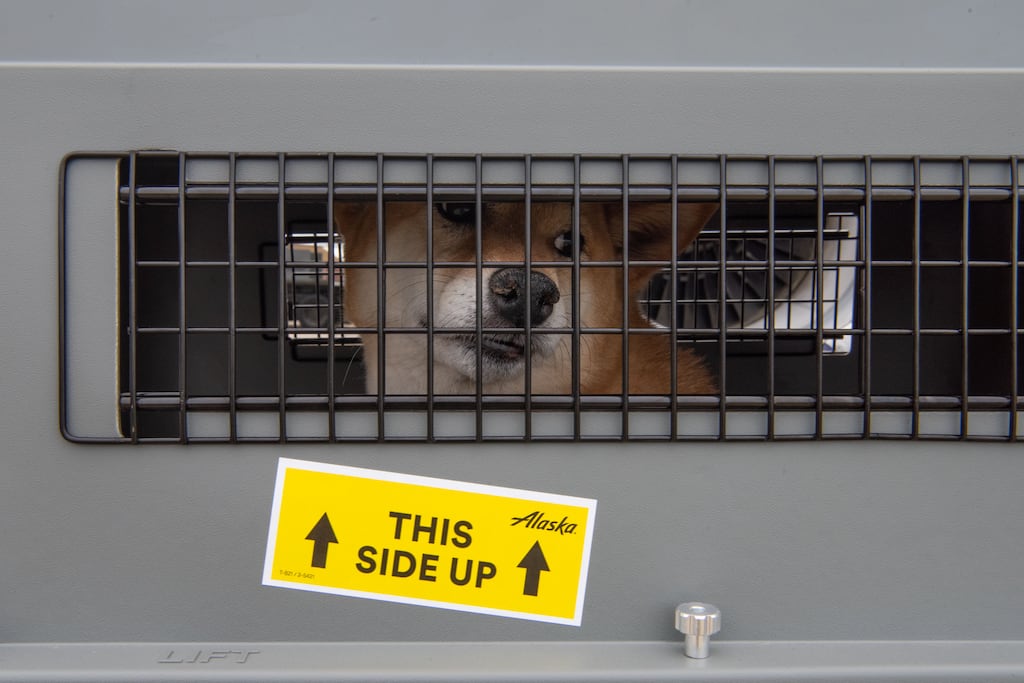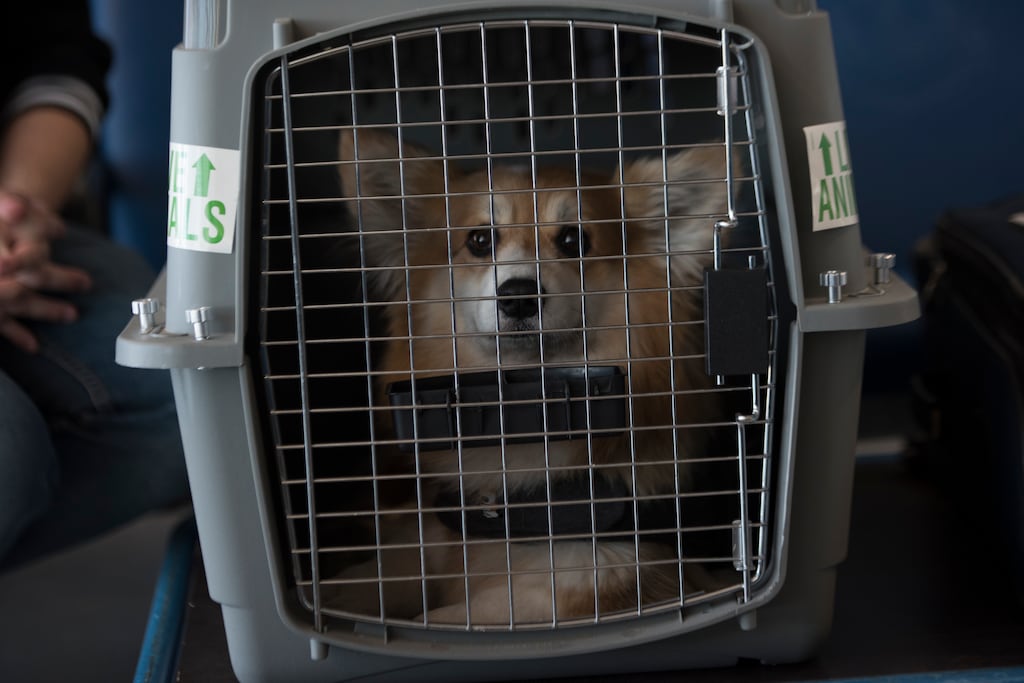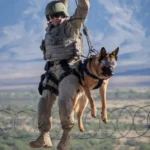Military Families Scramble to Navigate New U.S. Dog Travel Regulations Amid PCS Moves
Military families stationed overseas are facing a new challenge in transporting their pets back to the United States due to recently implemented regulations aimed at preventing the reintroduction of dog rabies into the country.

As the regulations take effect on August 1, many families in the midst of their Permanent Change of Station (PCS) moves are left scrambling to find alternatives for bringing their dogs home.
The new rules, combined with airlines refusing to transport dogs, are causing confusion and stress during the already hectic moving season.
Families have taken to social media to express their frustrations, with one military spouse commenting, “Why do things always have to be so complicated for military families to bring our pet family members with us when we move? As if moving far from home and family every few years isn’t stressful enough.”
Contents
- 0.1 The New CDC Regulations and Airline Restrictions
- 0.2 The Impact on Military Families
- 0.3 Confusion and Costs
- 0.4 Calls for Change and Advocacy
- 0.5 Conclusion
- 1 FAQ’s
- 1.1 What is the reason for the new dog travel regulations?
- 1.2 2. When do these new regulations take effect?
- 1.3 3. How are military families affected by the new dog travel rules?
- 1.4 4. Why have some airlines stopped allowing dogs to travel to the U.S.?
- 1.5 5. What alternatives do military families have for transporting their pets?
- 1.6 6. Are there any efforts to address these issues for military families?
The New CDC Regulations and Airline Restrictions
The new regulations, implemented by the U.S. Centers for Disease Control and Prevention (CDC), are designed to prevent the re-entry of dog rabies into the U.S. Though the disease was eliminated domestically in 2007, over 100 countries still struggle to control it.
These new rules will tighten the process of importing dogs, ensuring stricter documentation requirements, including proof of vaccination, microchips, and the CDC Dog Import Form.
In addition to the regulations, some airlines are halting dog transportation altogether. Lufthansa, once a pet-friendly carrier for military families, recently announced that it will no longer allow dogs on flights to the U.S. due to these new restrictions.
Eight airlines have made similar moves, leaving families unsure of how to bring their pets home.
The Impact on Military Families
For the 100,000+ U.S. service members stationed in Europe, these changes pose significant challenges. Liz Hensel, CEO of Leave No Paws Behind USA and 2024 Armed Forces Insurance Marine Corps Spouse of the Year, is advocating for solutions to help these families.
“I 100% agree we have to protect the population from rabies,” she said, “but there must be a better way than to leave hundreds of military families stranded in a situation where they have no idea what to do with their dogs.”
Hensel emphasized the importance of pets in military families’ mental health and well-being, adding that the decision by airlines like Lufthansa is “heartbreaking.” These pets are a source of comfort and stability for families moving frequently and adjusting to new environments.
Confusion and Costs
One of the most immediate problems military families face is the uncertainty of pet transportation. With airlines stepping back and the cost of pet shipping skyrocketing, many families will now have to rely on commercial pet shippers, which could cost anywhere from $2,500 to over $4,000, depending on the dog’s size and location.
This is a significant increase from the typical $400 families previously paid when pets were allowed to travel with them.
Though the Department of Defense (DOD) introduced a benefit in January 2024 to reimburse service members for pet transportation costs—up to $2,000 for international moves and $550 for domestic moves—these amounts may not cover the now elevated costs of shipping pets through private companies.
Calls for Change and Advocacy
Hensel and other advocates are calling for urgent adjustments to the CDC regulations, including exemptions for military families. They are also pushing for clearer guidelines, increased quarantine and vaccination facilities, and stronger partnerships with airlines to ensure safe and affordable transport for pets.
Members of Congress have joined the push for change. Representative Nick Langworthy, R-N.Y., along with six other lawmakers, has requested an 18-month delay in implementing the new requirements.
They argue that the rules are impacting low-risk dogs owned by military families, diplomats, and others moving internationally.
While the CDC has not yet indicated whether changes will be made for military families, advocates like Hensel remain committed to finding solutions.
“Our household pets really help with mental health, not only for the men and women serving but for the family dynamic as a whole,” Hensel noted, stressing that leaving families in limbo without a clear path forward is unacceptable.
Conclusion
As the new CDC dog importation rules take effect, military families overseas are facing difficult decisions and significant financial burdens. The timing of the regulations, during the military’s peak moving season, adds an extra layer of complexity for families trying to return to the U.S. with their beloved pets.
Advocates are pushing for policy changes and greater support for these families, but until adjustments are made, military families will have to navigate these challenges as best they can, often at great emotional and financial cost.
FAQ’s
What is the reason for the new dog travel regulations?
The new regulations, enforced by the U.S. Centers for Disease Control and Prevention (CDC), aim to prevent the reintroduction of dog rabies into the United States. Though the U.S. eliminated dog rabies in 2007, over 100 countries still struggle with the disease.
These rules require stricter documentation, such as vaccination records, microchips, and a CDC Dog Import Form, to ensure that imported dogs are free from rabies and other diseases.
2. When do these new regulations take effect?
The new regulations take effect on August 1, 2024. Unfortunately, this timing coincides with the military’s busy Permanent Change of Station (PCS) season, when many families are relocating, leading to confusion and complications with pet transportation.
3. How are military families affected by the new dog travel rules?
Many military families stationed overseas are now facing difficulties in bringing their dogs back to the U.S. due to airlines refusing to transport pets under the new regulations.
With some airlines, such as Lufthansa, stopping dog transport services to the U.S., families are left to find alternative (and often expensive) arrangements, such as hiring commercial pet shippers, which can cost several thousand dollars.
4. Why have some airlines stopped allowing dogs to travel to the U.S.?
Airlines are halting dog transport because they don’t want to be held liable if the new CDC regulations are not met. If a dog does not comply with the rules upon arrival, the animal could be denied entry and sent back at the owner’s expense.
To avoid the risk and legal issues, several airlines have stopped allowing pets to travel with families to the U.S.
5. What alternatives do military families have for transporting their pets?
Military families will likely need to rely on commercial pet shippers to transport their pets under the new regulations.
However, this can be costly, with prices ranging from $2,500 to over $4,000 depending on the dog’s size and travel distance. This is a significant financial burden compared to the previous cost of around $400 when pets could travel with families in the cabin or cargo hold.
6. Are there any efforts to address these issues for military families?
Advocates, including Liz Hensel, CEO of Leave No Paws Behind USA, are pushing for exemptions and adjustments to the CDC regulations for military families.
They are calling for clearer guidelines, better airline partnerships, and expanded quarantine and vaccination facilities. Additionally, lawmakers are urging the CDC to delay the implementation of the new rules for 18 months to allow for smoother transitions for military families, diplomats, and others affected.







